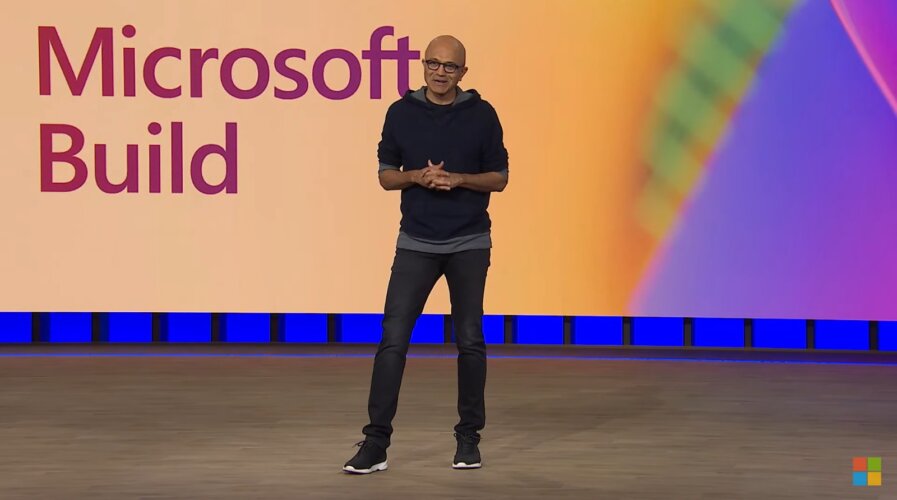
Microsoft dives deeper into AI at Build 2023. Here are some updates on copilots and pluginsSource: Microsoft
Microsoft dives deeper into AI at Build 2023. Here are some updates on copilots and plugins
- Microsoft is adopting the same open plugin standard that OpenAI introduced for ChatGPT, enabling interoperability across ChatGPT and the breadth of Microsoft’s copilot offerings.
This week, Microsoft kicked off its annual developer conference, Build 2023, and AI, as anticipated, took center stage with two major themes: copilot and plugins. “You only need two simple letters to accurately convey the major shift in the technology space this year: A and I,” Frank X. Shaw, Microsoft’s chief communications officer, penned in a blog post on Tuesday, May 23, the start of the three-day event.
For starters, Microsoft announced that it’s adopting the same plugin standard its close collaborator, OpenAI, introduced for ChatGPT, its AI-powered chatbot — allowing developers to build plugins that work across ChatGPT, Bing Chat (on the web and in the Microsoft Edge sidebar), Dynamics 365 Copilot, Microsoft 365 Copilot, and the newly launched Windows Copilot.
The company also introduced new features to help developers build their copilots and next-generation AI applications. That includes new tools called plugins that make copilots more useful by allowing them to interact with other software and services. A copilot is an application that uses modern AI and large language models to assist you with a complex cognitive task – from writing a sales pitch or catching up on a missed meeting to generating images for a presentation or planning a themed dinner party.
“You may look at Bing Chat and think this is some super magical complicated thing, but Microsoft is giving developers everything they need to get started to build a copilot of their own,” said Kevin Scott, Microsoft’s CTO, said. “Over the coming years, this will become an expectation for how all software works.”
Expanding the plugin ecosystem
Besides enabling interoperability across ChatGPT and the breadth of Microsoft’s copilot offerings, Microsoft also announced it is bringing Bing to ChatGPT as the default search experience.
“OpenAI introduced ChatGPT plugins in March. Microsoft announced plugins for Bing earlier this month,” Shaw said. According to him, that technology allows ChatGPT and Bing Chat to help you find and book a restaurant reservation using an OpenTable plugin, for example.
Therefore, Bing is adding to its support for plugins as part of this shared plugin platform. “In addition to the ones previously announced for OpenTable and Wolfram Alpha, it will also have Expedia, Instacart, Kayak, Klarna, Redfin, TripAdvisor, and Zillow, among many others in the Bing ecosystem,” Shaw added.
To top it off, Microsoft also unveiled that developers can now extend Microsoft 365 Copilot with plugins. “Plugins for Microsoft 365 include ChatGPT and Bing plugins, as well as Teams message extensions and Power Platform connectors – enabling developers to leverage their existing investments,” Shaw said in the blog post.
That also means developers can quickly build new plugins with the Microsoft Teams Toolkit for Visual Studio Code and Visual Studio. “A plugin is about how you, the copilot developer, give your copilot or an AI system the ability to have capabilities that it’s not manifesting right now and to connect it to data and connect it to systems that you’re building,” Scott said. “I think there’s going to eventually be an incredibly rich ecosystem of plugins.”
New AI tools by Microsoft for building your copilot
On the first day of its annual Build conference, Microsoft also launched Azure AI Studio, a new capability within the Azure OpenAI Service that lets customers combine a model like OpenAI’s ChatGPT or GPT-4 with their data — whether text or images — and build a chat assistant or another type of app that “reasons over” the private data.
To further extend the capabilities of large language models, Microsoft also announced support for plugins with Azure OpenAI Service. Azure AI also now supports Azure Machine Learning prompt flow, a sophisticated prompt engineering tool, John Montgomery, Microsoft’s CVP of AI platform Montgomery shared.
“We’ve built a bunch of these copilots. We’ve looked at a bunch of the different architectures out there for how you load other information in, how you create reproducible content, how you feed the model the right stuff so that it gives the right answers,” he said.
A unified data analytics platform
Powering organization-specific AI experiences requires a constant supply of clean data from a well-managed and highly integrated analytics system. But most organizations’ analytics systems are a labyrinth of specialized and disconnected services.
As such, Microsoft introduced Microsoft Fabric, a unified platform for analytics that includes data engineering, data integration, data warehousing, data science, real-time analytics, applied observability and business intelligence, all connected to a single data repository called OneLake.
It enables customers of all technical levels to experience capabilities in a single, unified experience. It is infused with Azure OpenAI Service at every layer to help customers unlock the full potential of their data, enabling developers to leverage the power of generative AI to find insights in their data.
Avanade, a leading Microsoft solutions provider, asserts that Microsoft Fabric is the catalyst that will enable businesses to realize the unparalleled benefits of generative AI technology. Avanade has been chosen as the Microsoft Fabric launch partner – a result of its significant contribution in shaping and testing the platform during its private preview.
“The launch of Microsoft Fabric heralds a new transformative era – empowering organizations with data integrity, optimized access, and limitless potential. It marks a pivotal moment for data, analytics and AI platforms – delivering timely and undeniable insights that meet the fast-paced demands of modern business. Microsoft Fabric will harmonize the intelligent data platform and Power BI and help clients establish a strong digital core to seize the growth opportunities of generative AI,” Alan Grogan, Head of Data Platform Modernization at Avanade, commented.
READ MORE
- 3 Steps to Successfully Automate Copilot for Microsoft 365 Implementation
- Trustworthy AI – the Promise of Enterprise-Friendly Generative Machine Learning with Dell and NVIDIA
- Strategies for Democratizing GenAI
- The criticality of endpoint management in cybersecurity and operations
- Ethical AI: The renewed importance of safeguarding data and customer privacy in Generative AI applications


